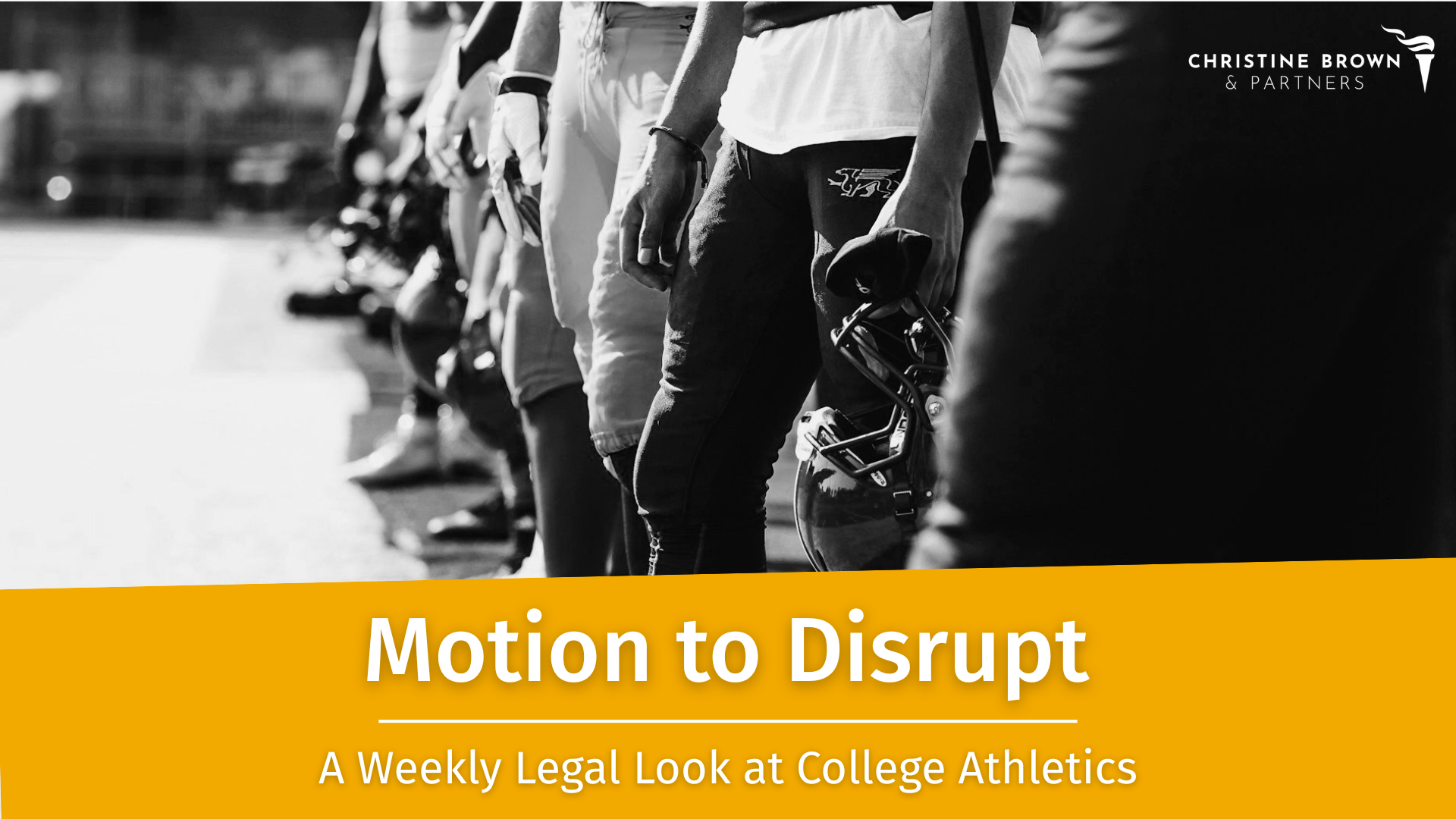Motion to Disrupt Vol. 6
Trump’s NIL Power Play: Regulation Without Representation for Athletes
OPENING STATEMENTS
President Donald Trump is reportedly preparing to sign an executive order setting national standards for name, image, and likeness (NIL) in college sports. The move would likely echo priorities found in the NCAA-backed SCORE Act, which recently passed the House. That includes antitrust protections, preemption of state NIL laws, and a ban on student-athlete employee status. With slim odds in the Senate, an executive order becomes a workaround.
Executive orders can’t override state law or create new federal powers—but they can shape federal policy, direct agencies, form commissions, and influence how funds are allocated and rules enforced. In a fragmented system like college sports, that’s more than enough to shift momentum.
So let’s game this out. If this order drops, what happens? What does it mean for athletes? And is this just the latest move in a long playbook of institutions denying rights to the people who drive their billion-dollar industry?
Four outcomes to watch:
Employment Status Sidestep
The NCAA’s nightmare is athletes being deemed employees. A Trump order could signal opposition to that classification, reaffirming the now-rescinded Biden-era NLRB memo. Lawsuits like Johnson v. NCAA would continue, but the message from the White House would be clear: no support for athlete labor rights. Courts still decide—but policy posture matters.A Presidential Commission Formation
Trump is reportedly considering a commission, possibly featuring Nick Saban. These panels don’t carry legal weight, but they steer public discourse and offer political cover. A commission packed with NCAA allies would likely push back on athlete empowerment, wrapped in buzzwords like “protecting amateurism” and “preserving education.”Agency Action and NIL Crackdowns
Federal agencies could lean in. The FTC might target collectives and what’s now being termed “NIL abuse.” The Department of Education could issue “voluntary” standards that consolidate control, like the NIL Go clearinghouse model. This has already been a major flashpoint, as Michael McCann details in Sportico with last week’s NIL guidance from the College Sports Commission, followed by a retraction demand from the lawyers involved in the House vs. NCAA settlement.Strings Attached to Federal Money
An order could tie compliance with federal NIL standards to access to federal money. It’s bold, but not new. The federal government has long used funding to shape state and institutional behavior, which is playing out most notably in Harvard vs. the current administration. It’s legally messy, but functionally can be effective.
What does all of this mean for student-athletes? Despite House v. NCAA cracking the door and letting a few things out, this looks like a fast-track plan to bolt it shut before athletes realize how much more is there.
Standardization at a Cost
A uniform NIL system could reduce confusion. But it’s only fair if athletes are involved in writing the rules, which they almost never are.Earning Limits Are on the Table
If Saban’s influence holds, expect limits aimed at “competitive equity.” It’s a talking point that often translates into restricting athlete compensation. Athletes earning six- and seven-figure deals may become targets under the guise of leveling the playing field.Employment Questions Stay Open
Executive orders can’t settle the employee debate. The courts will. But this would send a clear message: the executive branch no longer backs expanding labor rights for athletes. That stance could discourage legislative action and embolden institutions.Gender Equity Could Suffer
With Title IX protections for revenue-sharing now revoked, there’s no guarantee women athletes will receive proportional NIL compensation. If the Trump administration reinstates protections, it could help. If it doesn’t, or goes further in stripping oversight, existing disparities will widen.
The bottom line is this: This executive order wouldn’t resolve the NIL mess. But it could lock in the NCAA’s strategic gains. The implications are clear: more control for institutions, more limits for athletes. This is regulation in the NCAA’s image. Athletes should stay wary.
EXHIBIT A
There was a lot of news out of SEC Media Days, since the conference is the de facto power center in college sports. But it was this quote from Georgia football coach Kirby Smart that left a mark: “Opportunities are being lost all across college athletics,” he said. “Unfortunately, that’s part of it. I can’t really give a message to the next walk-on because I don’t know that there’s going to be an opportunity for that walk-on.” Schools of opportunity are now opportunity lost.
EXHIBIT B
SEC Commissioner Greg Sankey and other Power 4 conference leaders have said they’re passing on private equity: “ Just jumping to something because there’s a pot of money there seems [like] an uninformed direction," Sankey said at SEC Media Days. But for how long? Big bills are coming. The money pressure is mounting. And at least one contract centers on revenue growth. New AD Jim Smith can earn a $1.5M bonus if he grows revenue by $50M in five years. “We’re going to focus on revenue,” Smith said at his introductory press conference in May. When incentives look like this, expect schools to chase every dollar. If private equity isn’t in the playbook yet, it’s probably just a matter of time.
ON THE DOCKET
The numbers are in, with 310 of 364 schools opting into the House vs. NCAA settlement. Of note, some non-football schools opted in, including Johns Hopkins and Augusta State, which have, respectively, had powerful lacrosse and golf programs. They have the same access to money, and they don’t have football expenses. Here’s what I see: in five years, we’re going to see a fundamental shift in which schools completely dominate certain sports. With smart investment, niche becomes power. A new, more specialized arms race is just getting started.
FOOTNOTES
"This is still college. This is not the NFL." – Brian Kelly talking about the ecosystem broadly and that the mission remains graduating kids. (via @bportnoy15)

